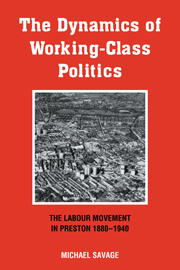Book contents
- Frontmatter
- Contents
- List of tables, maps and figures
- Preface
- Acknowledgements
- 1 Political practices and the social structure
- 2 The diversity of working-class politics
- 3 The local bases of practical politics
- 4 Labour market structure in Preston, 1880–1940
- 5 Urban structure and associational practices
- 6 The emergence of independent Labour politics, 1880–1914
- 7 The transformation of the Labour party, 1914–40
- 8 Conclusions
- Appendices
- Notes
- Bibliography
- Author index
- Subject index
2 - The diversity of working-class politics
Published online by Cambridge University Press: 05 November 2011
- Frontmatter
- Contents
- List of tables, maps and figures
- Preface
- Acknowledgements
- 1 Political practices and the social structure
- 2 The diversity of working-class politics
- 3 The local bases of practical politics
- 4 Labour market structure in Preston, 1880–1940
- 5 Urban structure and associational practices
- 6 The emergence of independent Labour politics, 1880–1914
- 7 The transformation of the Labour party, 1914–40
- 8 Conclusions
- Appendices
- Notes
- Bibliography
- Author index
- Subject index
Summary
In this chapter I shall argue that three distinct types of working-class practical politics may develop out of the interests of the working class to reduce material insecurity. These can be seen as attempts to reduce the insecurity inherent within the capitalist labour market by trying to move out of it, by struggling within it to weaken employers' discretion to treat labour as a commodity, or by forcing the state to alter the structure of the labour market in some way advantageous to the working class. More exactly these types of struggle can be identified as, firstly, ‘mutualist’, in which workers struggle to establish their own independent provision of jobs and services; secondly, ‘economistic’, in which workers struggle to force employers to guarantee job security; and finally ‘statist’, in which the state is used to establish measures of security. In each case these struggles may take patriarchal or non-patriarchal forms, and collectivist or individualistic forms; the focus of this chapter will be on collectivist forms. The struggles are all ‘rational’ responses to the problem of insecurity, yet it is vital that these are not conflated, for they do not entail each other; and, in ways which will be discussed below, they may also be incompatible with each other. It is important to establish this point in order to emphasise that there is no one ‘natural’ way by which workingclass interests manifest themselves in political action. The underdetermination of political practice by social interests must be recognised here.
- Type
- Chapter
- Information
- The Dynamics of Working-class PoliticsThe Labour Movement in Preston, 1880–1940, pp. 20 - 38Publisher: Cambridge University PressPrint publication year: 1988
- 2
- Cited by



